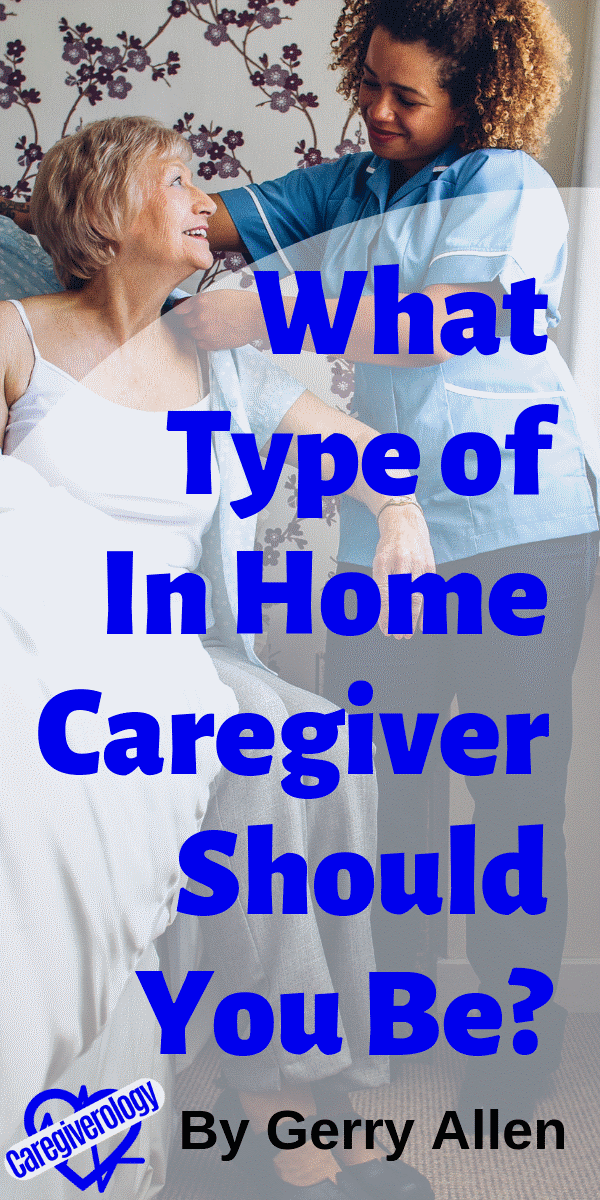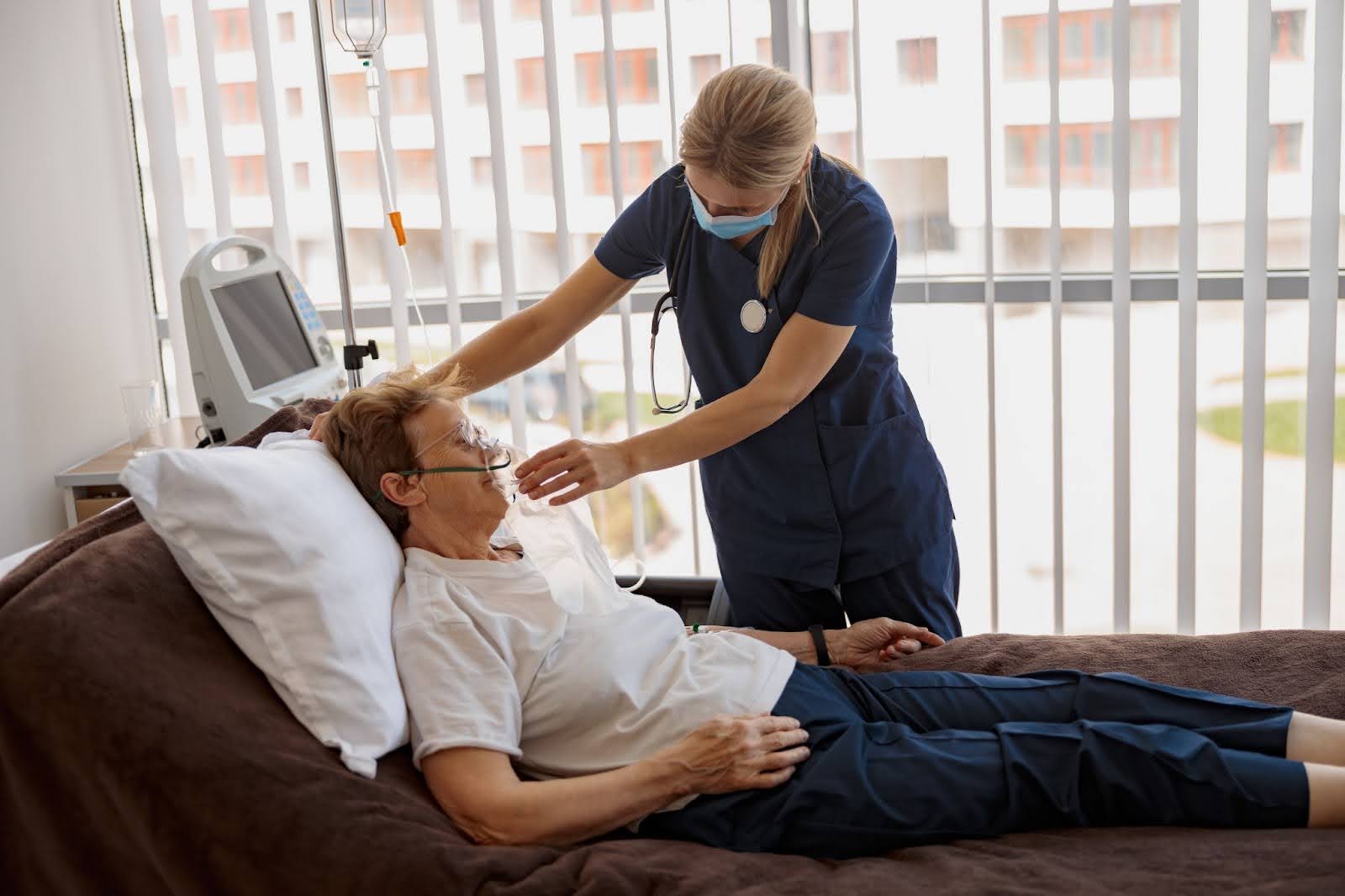What Type of In Home Caregiver Should You Be?
There are many different types of in home caregivers and contrary to what many people believe, the various types are different in several ways. Not all of them supply the same type of care or supply the same care in exactly the same way. In this article, I will discuss a few different types of caregivers and the types of care that they supply to help you better understand the type you may want to be.
Non medical Standard vs HHA Right for you Medical Type of care Credentials Difficult Advice Grow
Non Medically Related Caregivers
To start off we'll talk about non medically related caregivers. Non medically related caregivers are simply that, non medical. They supply in home care assistance. They try to keep their patient's lives as regular and consistent as possible so they can continue to live their lives the way they wish to.
Some of the things that a non medically related caregiver may assist with are as follows:
- Safety and supervision
- Assistance with transferring from one place to another
- Personal care and hygiene assistance
- Meal preparation
- Light housekeeping
- Some companies also provide transportation to and from appointments or the grocery store
Standard Vs Certified Home Health Aids (HHA)
There are two different types of non medical caregivers.
There are standard caregivers that are not required to be certified or medically trained in any way. They are simply there to assist patients with their everyday life without basing their care off of any specific regulation other than their companies requirements.
Then there is Certified Home Health Aids (HHA). These are non medical caregivers that are certified in one or more ways. Most HHAs are required to be certified in their specific state's regulations for care. This means that they provide care based on what the state suggests is the best way to complete the care. It isn't different care than a standard caregiver, it's just regulated in a different way.
Lets break it down just a tad more. A standard caregiver can assist with a bath based on personal preferences and their companies requirements. However, a certified HHA is required to assist with bathing in a more detailed and specific order. Most states base their requirements on ways they have found to be the safest, sanitary and most efficient ways to complete the care.
Some HHAs are also required to be cardiopulmonary resuscitation (CPR) certified while some standard caregivers are not. While most standard caregivers are not required by state law to be CPR certified, their company may require it. If this is a concern then you can always just ask the company beforehand if their caregivers are CPR certified. Some companies even supply the certification if it is required.
So an HHA supplies the same type of care as a standard caregiver. The difference is that they have been taught by specific regulations how to complete the care in ways the state has deemed to be the best way to do so.
Which is Right for You?
So if you want to be a caregiver that is there to assist with regular daily activities, without much preference, a standard non medical caregiver is the way to go. If you are not CPR certified and don't want to get your certification, check with the company you are inquiring about prior to applying to see if it is a requirement.
If you want to be a caregiver that has been taught and is required to supply care based on your states regulations, I would recommend a company that employs certified HHAs (which by MOST state requirements, you would also need to be CPR certified). Most companies that supply HHAs offer HHA and CPR classes in office. Ask the offices that supply that type of care if they also offer those certifications.
Medically Related In Home Care
Lets get into more medically related in home care. There are many different types of in home care you can inquire about that supply more medically certified care. Some companies supply both non medical caregivers and medical staff to assess with various situations on an as needed basis.
These companies usually supply a non medical caregiver during regular daily care and have a medically certified caregiver or nurse on standby to assess any medical issues they may inquire about. These types of companies usually cost more for the client, but are more commonly recommended if there are medical conditions involved that may require more medically related attentiveness.
These types of companies usually only employ less medical staff and more caregiver staff. So snagging a job for more medically related care at a company that supplies both is a little more difficult. Most companies that offer both usually use only registered nurses (RN) for their medical care. However, companies that are more medically established usually hire multiple types of medically related staff.
What Type of Care do They Give?
Companies who supply more medically related staff are very different than their non medical counterparts. These types of caregivers supply strictly medical care. Most companies that strictly supply in home medical staff are there to help their clients continue living at home while going through a recovery or serious medical condition.
They USUALLY do not supply in home care assistance with everyday living, but rather assist with the cleaning and dressing of wounds or continued assessments with an ongoing medical treatment they are going through. Here are some types of conditions that may require more medically related care:
- Serious wound or injury that requires continued cleaning or redressing
- Rehabilitation after a serious injury
- Ongoing excessive amounts of physical or occupational therapy
- Hospice or end of life care, etc.
These aspects vary based on not only the medical conditions patients may endure, but also what their medical insurance covers. Most of these more medically related companies also work alongside non medical caregivers from other companies if they are approved to do so through their medical coverage.
What are the Required Credentials?
So lets break down what these companies require. Most of these types of caregivers have had more long term medical training, such as a licensed practical nurse (LPN), registered nurse (RN), or even a certified nursing assistant (CNA). They are usually supplied to clients that require more medical care than home care.
If you have previous certifications, such as LPN, CNA or RN, I would highly recommend applying in the more medically related fields of a caregiver. More medically related companies are always on the lookout for more caregivers. Some companies even supply some types of physical and occupational therapists as well, but those types of fields are not quite as common in caregiver positions quite yet.
It Can be Difficult
These types of jobs however require more endurance than you would imagine. This is especially true in Hospice or end of life care. Not only would you be caring for your patient, but also assisting the families with their personal endurance while losing a loved one.
Caring for someone in a more medical aspect can be difficult due to how the patient is feeling at that moment. If they are depressed from their condition or in large amounts of pain, they may lash out towards you. This can also be a concern for non medical caregivers as well.
Do not take these moments personal. Always remember that you are making a difference in keeping your patients as safe and healthy as possible. If at any point these moments become unsafe for you or the patient ALWAYS record and report it to your office. Be sure to follow all safety regulations your office requires you to.
Working alongside of other companies can also be difficult as requirements for care can be different and cause friction between caregivers. Its best to remain assisting in your required way. You are responsible for providing care in the way you were taught to give it.
If you feel the other caregivers are not assisting properly, contact your office and report it to those above you. If at anytime it is necessary, your office will make the proper reports for the other company or caregiver. Doing this refrains the caregivers from allowing friction between them to get in the way of doing their jobs.
Some Final Advice
My greatest advice when venturing through your options is to sit and write down must haves as far as the type of company you would like to work for. Knowing the difference in the types of in home caregivers should help you understand a little more on what you are looking for.
If you already have certifications but wish to venture elsewhere in the field, look to places that don't supply the type of care you would normally give. However, if you would like to stick within your certification or become certified in some way then look for that specific type of company.
While working as a caregiver, if at anytime you feel like this field isn't for you don't hesitate to contact your office. They know caregiver jobs are not for everyone and they can be difficult at times. Ensuring that you are up for the tasks asked of you not only ensures that you can do the job, but also that your patients receive the best care from you as well.
If you are still unsure of the path you want to take, just start looking around. Most areas have many different companies to work for. You could also call them. They would be more than happy to tell you what you would need to know to make a more sound decision. Be sure to assess all your options before applying.
Don't be Afraid to Grow
Many companies will help you grow within the field if you just explain to them what your personal goals are as a caregiver. This space can open a wide variety of possibilities. Between the different types of caregivers and companies, your options are almost endless.
If you explain your personal goals to the company you work for, most of them will assist you in your goals any way they can. Your goals can grow as quickly as you would like or be as slow paced as you need them to be. Don't be afraid to contact a new company with your goals in mind. They are there not only to assist the patient, but the caregiver as well.
Thank you Gerry Allen for contributing this article.
Guest Articles Written for Caregiverology
From What Type of In Home Caregiver Should You Be? to Home
Recent Articles
-
How to Plan for Aging: Financial, Health, and Lifestyle Considerations
Mar 29, 25 12:40 PM
Did you know that 70% of people over 65 will need some form of long-term care? Yet, many delay planning until it’s too late. Aging is inevitable, but how we experience it depends on preparation. -
Speech Disorders: How to Know When It's Time to See a Professional
Mar 27, 25 07:05 AM
When it comes to human interaction, we need to be able to communicate effectively. -
Who Provides What? The Distinct Duties of Nurses and Caregivers
Mar 26, 25 07:37 PM
When it comes to healthcare, the roles of nurses and caregivers are often misunderstood. While both are essential in providing support and care, their responsibilities, training, and the level of care…





New! Comments
Have something to say about what you just read? Leave a comment in the box below.